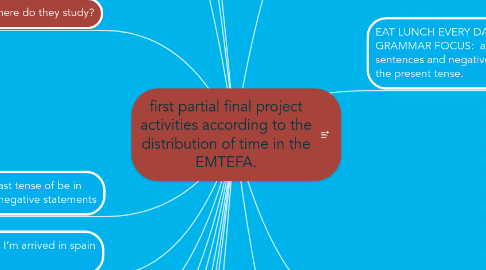
1. Grammar focus: Past tense of be (was/were) 2- yes/no questions with was/were 3- Descriptive adjective+noun
2. Where are you doing?
2.1. Grammar focus: Who + be + going where + be + noun/pronoun+ing
2.2. Example: where are the teachers eating lunch? R= they’re eating in the dinner of the college Questions with do and does Example: Does he drinks coffe? Yes he does/ no he doesn’t Do you have listen to the music in the classroom? No I don’t listen to the music/ No I don’t Eat something for a meal
2.3. Vocabulary other After, before, early, late Nouns: Class, lesson, toast
3. Where are you from?
3.1. Grammar focus: how many+ nouns+ be/do Example: How many pencils are on the desk?
3.1.1. Project specifications
3.1.2. End User requirements
3.1.3. Action points sign-off
3.2. Vocabulary verbs: choose, look up, mark, memorize, review, select Expressions: what country are you from?
3.2.1. Hi, my name is luis mosqueda mendez, I`m living in the city mexico, I Speak spanish and I don't now english but this is my English dictionary and I memorize English words every week, and my class started at seven o'clock I have fifty minutes the class with the teachers and ten minutes of breaks.
4. Where do they study?
4.1. Where+ simple present tense
4.2. The "simple past" is used to talk about an action that ended in a previous to the current time. The duration is not relevant. The time the action takes place can be the recent past or distant past.
4.3. What+ siemple present tense
4.4. When+ simple present tense
4.5. usually we studied in the military school and the tasks we perform at night in the schoolroom. Study different subjects, for example, military ethics, military history, English, computer science, in every matter is a different teacher.
5. Example: past tense of be in affirmative/negative statements
6. Afirmative: I’m arrived in spain now
7. I’m not arrived in spain now
8. Negative: I’was in spain last year
9. I wasn’t in spain last year
10. Example text: the students are cold today
11. Negative: the students weren’t cold today
12. I am good running yesterday because she’s short and I so tall.
13. In February my colleagues and I had practiced shooting in which the sergeant asked us we formed by stature to fire the weapon. I was good at shot because I hit some inside, but my partner did not because he was very nervous and got in a short distance. We were all very excited because it was our first out of school since the day we enter
14. When does the bus leave?
14.1. Gramar focus: always, sometines, never, how often Verbs: have/has for speak Expressions: what lenguages do you speak? Nouns: arabic, spanish, egypts, spain Example: use always sometines and never after simple present BE
14.1.1. 1: He is sometimes early. Use always sometimes and never before present tense verbs
14.1.2. 2: I always study late Sometime is used at the beginning or at the end of the sentenses.
14.2. 3: sometimes they study late They study late sometimes sentenses. Seeking information and responding to questions about schedules Text: hello, when is the plane to Spain? There is a plane at 12:30 in the afternoon
14.2.1. Sometimes lead us to the auditorium for lectures, that spends his days visiting because they have never come to visit.
15. EAT LUNCH EVERY DAY: GRAMMAR FOCUS: affirmative sentences and negative statements in the present tense.
15.1. AFFIRMATIVE SENTENCES: is a traditional grammatical term for any statement that is positive, not negative. Also known as an assertive sentence or affirmative proposition.
15.2. NEGATIVE SENTENCES: A negative sentence (or statement) states that something is not true or incorrect. A negative adverb has to be added in order to negate or “cancel” the validity of the sentence. This “negation” element is created according to the following general rule.
15.3. THE VOCAVULARY: parts of the day
15.3.1. In the morning, at noon, in the afternoon, in the evening, at night and midnight.
15.3.2. for example I get up at 4:30 in the morning after I make my bed to take a bath, at 6 in the morning is breakfast time and classes begin at 7 am and end at noon.
15.3.3. This topic discusses the activities we do at certain times of day,
15.3.4. THE VOCAVULARY: parts of the day
15.3.5. In the morning, at noon, in the afternoon, in the evening, at night and midnight.
16. knows the answers?
16.1. Grammar focus: Who + simple present tense
16.1.1. Sports activities consist of running, bars, crunches, swimming. After sports activities returned to the bedroom to take a bath and at 2 pm we go to the dining room. Last week were in the audience at an exhibition of different subjects and memorize several words.
16.1.2. who`s eating breakfast
16.1.3. My clasmate aeting brakfast
